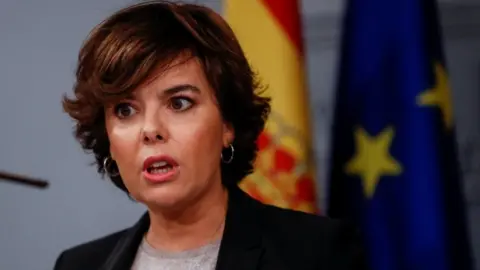Spain warns Catalonia on self-rule as deadline looms
 Reuters
ReutersSpain will move to suspend Catalonia's autonomy unless the region's leader drops his push for independence, the deputy prime minister says.
Soraya Sáenz de Santamaría gave the warning a day before a Spanish deadline to Carles Puigdemont was due to expire.
Catalonia's government has insisted it will not meet Madrid's demands in the wake of a disputed vote on secession.
There have been protests over the detention of two leaders of the separatist movement.
Jordi Sánchez and Jordi Cuixart are being held while they are investigated for sedition - a move which many on the pro-independence side see as politically motivated.
The men were leading figures in the 1 October independence vote, which Madrid branded illegal.
After the referendum, Catalan leader Carles Puigdemont signed a declaration of independence but halted its implementation and called for negotiations.
Prime Minister Rajoy has given Mr Puigdemont until Thursday to come up with a definitive answer on the independence question or face the implementation of direct rule under Article 155.
"All I ask of Mr Puigdemont is that he acts sensibly... to put the interest of all citizens first," Mr Rajoy told the Spanish parliament on Wednesday.
But if the separatist leader does not provide a satisfactory response by 10:00 local time (08:00 GMT) on Thursday, he "will provoke the application of Article 155", Ms Saenz de Santamaria said.

Stiffening resolve on both sides
By Guy Hedgecoe, BBC News, Madrid
Spanish Prime Minister Mariano Rajoy is cautious by nature but the fact he and his government are now openly discussing suspending Catalonia's autonomy reflects how much relations have deteriorated.
Deputy Prime Minister Soraya Sáenz de Santamaría's insistence that the Catalan government "return to legality" by Thursday morning's deadline appears to be firm but Carles Puigdemont is not expected to heed that appeal.
He is under pressure from influential factions within the secessionist movement to push ahead with his independence "roadmap".
There is also a feeling among many of Mr Rajoy's supporters and allies that he should act swiftly and his government is likely to confirm its implementation of Article 155 soon after Thursday's deadline.

Article 155 of Spain's 1978 constitution allows Madrid to impose direct rule in a crisis but it has never been invoked in democratic Spain.
It would be Spain's Senate, controlled by Mr Rajoy's conservative Popular Party (PP), that would launch the transfer of powers from Catalonia to Madrid.
It is thought this could range from taking control of regional police and finances to calling a snap election.
'Fear over dialogue'
If Mr Puigdemont called an election in the region himself, Madrid would not invoke Article 155, a journalist for Catalonia Radio Albert Calatrava said, citing Spanish government sources.
But the foreign affairs chief for Catalonia's regional government, Raul Romeva, told Reuters news agency: "Elections are not on the table now."
The Spanish parliament has seen sharp exchanges, with the head of one left-wing Catalan party accusing the government of choosing humiliation, repression and fear over dialogue.
At one point, politicians from radical left-wing Spanish party Podemos held up placards urging the release of the Catalan independence activists, calling them "political prisoners".
Mr Sánchez and Mr Cuixart are being investigated over a protest on 20 September in which a crowd blocked Civil Guard officers inside a building in Barcelona.
